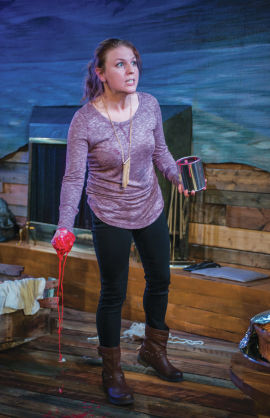
Abbie Spallen's Ireland is so rarely seen amid that country's U.S. exports that audiences may be forgiven departing the theater unsure of what they have just seen. Instead of an Emerald Isle where time stopped before 1948, the problems faced by the small coastal town along the Irish border that provides the setting for Strandline are more associated in our minds with those of Eastern Europe or the recently disbanded Soviet Union.
What we know at the start is that daughter Triona's wedding reception has been derailed by her father's unexpected plunge off the high cliffs flanking the house, drawing stepmother-of-the-bride Mairin, mother-of-the-groom Clodagh, and family friend Eileen to the rim of the precipice where they can monitor the coast guard's unsuccessful search for the drowned patriarch. Days later, after the formal obsequies, Mairin hosts a private gathering of her intimates to celebrate an ancient Celtic rite involving the launching at sea of a weighted coffin symbolizing the lost victim. As the evening proceeds, though, the agenda of tea, hand-crafted artifacts and shared memories of the deceased gradually progresses to whiskey and darker revelations—the latter exacerbated by the kibitzing presence of the recently orphaned teenager, Sweeney.
It helps to understand the events under discussion if you know that in 1998, a peace treaty was negotiated between the British-affiliated Northern Ireland and the independent Republic of Ireland, formally ending centuries of civil war. Bygones don't become bygones overnight, however, and the first step in rehabilitating social structures long-divided by internal upheaval is usually a period of power-grabs by opportunists whose expedient—often criminal—methods meet with popular approval because they get the wheels moving again. Ah, but when the economy of a small community relies on turning a blind eye to certain practices, loose lips sink more than ships.
If this dimension is totally lost on you, you still needn't fear boredom—not when you have Chicago's foremost tough girls, Kirsten Fitzgerald and Dado, swapping repartee with film-noir shrewdness, ably supported by Natalie West as the dithery Eileen, Meg Warner as the angry Triona and young John Francis Babbo holding his own as the forlorn Sweeney, whose dramatic significance becomes apparent only after we have been lulled into dismissing him as little more than narrative decoration. Indeed, while J.R. Sullivan's characteristically light directorial touch may tempt playgoers to settle into comfortable sisterly-solidarity mode, those familiar with the leisurely set-ups of David Mamet will be on the alert for a payoff as chilling as it is inevitable.
